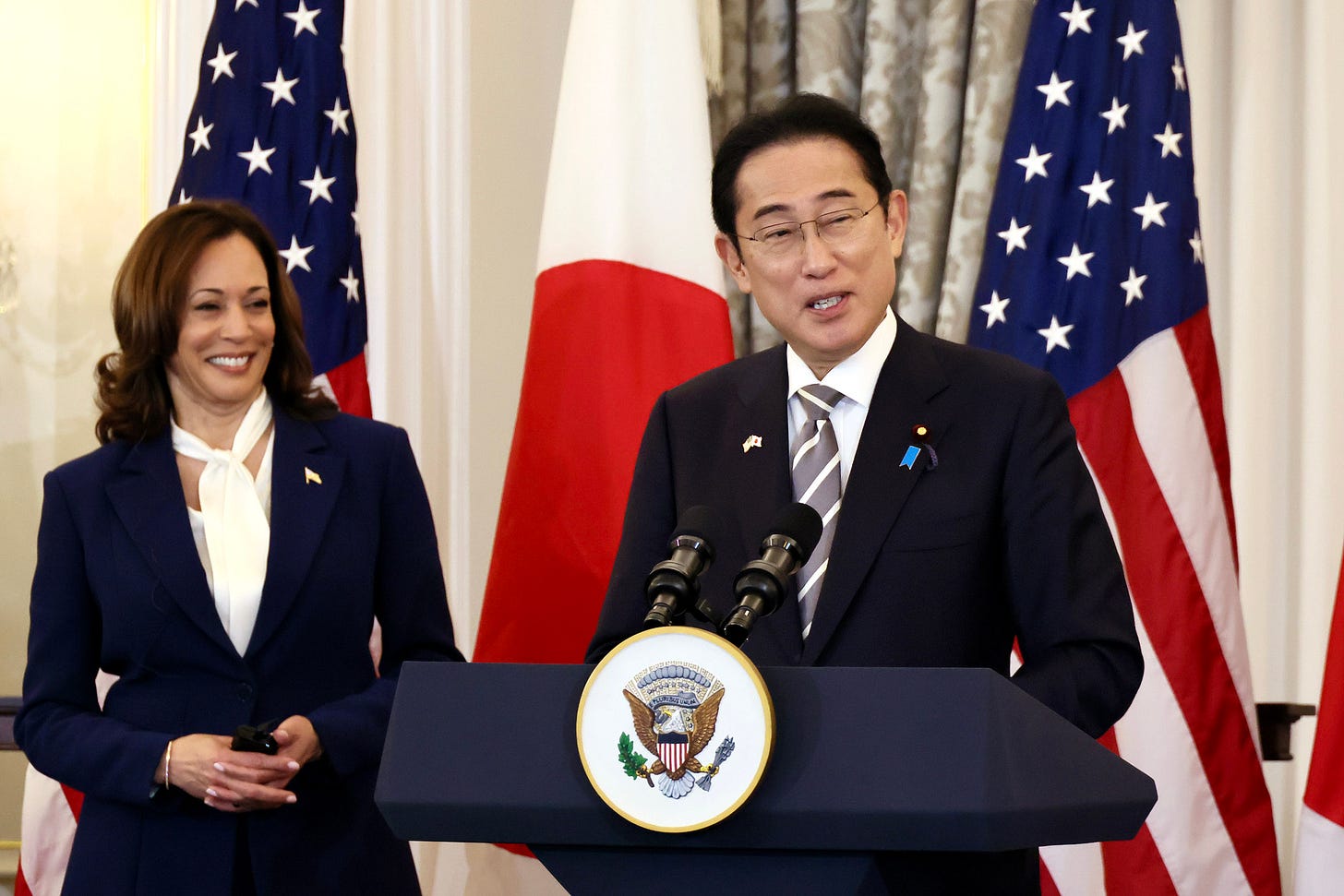Biden's decision reverberates across the Pacific
A more competitive US race could have second-order effects in Tokyo
Thank you for reading Observing Japan. This post is available to all readers.
If you are looking for timely, forward-looking analysis of the stories in Japans’s politics and policymaking that move markets, I have launched a new service through my business, Japan Foresight LLC. For more information about Japan Foresight’s services or for information on how to sign up for a trial or schedule a briefing, please visit our website or reach out to me.

In the days leading up to US President Joe Biden’s announcement on Sunday, 21 July that he will not seek reelection, the mood in Japan regarding the US presidential election appeared to have shifted from moshi-tora (“What if Trump?”) to hobo-tora (“Probably Trump”) to kaku-tora (“Definitely Trump”). The reaction in Japan to Donald Trump’s defiant response to the attempt on his life and the Republican Party’s convention that followed on its heels – combined with the ongoing strife within the Democratic Party over Biden’s candidacy – appeared to fuel a consensus in Tokyo that the Japanese government would soon be dealing with a second Trump administration.
Indeed, Liberal Democratic Party (LDP) Secretary-General Motegi Toshimitsu, who has been stepping up a shadow campaign for the LDP’s leadership, literally said in a speech in Niigata on Saturday, 20 July, “We still cannot say for certain, but the mood in the US is now moving from ‘probably Trump’ to closer to ‘definitely Trump.’’” (Motegi, of course, is pinning his hopes in the LDP election on kaku-tora, highlighting Trump’s praise for him as a “tough negotiator.”)
Accordingly, with Vice President Kamala Harris all but certain to succeed Biden at the top of the ticket, the implications of the change in the US presidential election will be felt acutely in Tokyo. Prime Minister Kishida Fumio’s reaction was, not surprisingly, muted – “We will continue to monitor future developments closely” – but to the extent that LDP members are weighing who the next US president will be in their calculations for the LDP’s leadership election, a major shift in the US campaign could affect Japan’s domestic politics directly.
If a second Trump administration looks less likely in the coming weeks, it will alter the LDP race in several ways. The most immediate impact could be that Motegi will have to tone down his efforts to sell himself to LDP voters as the Trump whisperer. While the right wing is not necessarily convinced that Biden’s exit has changed the situation – the tabloid Yukan Fuji, for example, points to pre-exit polling suggesting that Harris is no more popular than Biden and former president Barack Obama’s failure to endorse Harris to suggest that Trump is still the overwhelming favorite – this view is not necessarily widely shared. And to the extent that the “Trump whisperer” argument is probably Motegi’s best argument for the LDP’s leadership, a more uncertain US presidential race probably harms Motegi’s long-shot candidacy.
Meanwhile, the scrambled US outlook may give Kishida a boost, to the extent that LDP voters questioned his fitness to parlay with Trump. The aforementioned Yukan Fuji article, for example, explicitly said that if Trump returns, there is no part for Kishida to play, which probably speaks for a lot of conservatives. Even if Kishida cannot overcome his low approval ratings and decides not to run, if it appears that Harris could win, it is conceivable that the LDP might give more serious consideration to Foreign Minister Kamikawa Yōko, i.e. selecting Japan’s first female prime minister to match the first female US president. Kamikawa’s chances are likely slimmer if Tokyo continues to view Trump as the overwhelming favorite, as LDP members may doubt the wisdom of putting a female leader up against Trump. Asahi quotes an anonymous senior LDP lawmaker as saying, “If they are not a person who can hold their own against a heavyweight president, they cannot be prime minister.” In general, the possibility of a “normal” US administration under Harris – which would likely continue the Biden administration’s emphasis on cooperation with allies in the Indo-Pacific – the ability to manage a relationship with Trump may play a less significant role in voters’ thinking, creating space for a wider field. That said, greater uncertainty about the outcome of the US election could put a premium on a skilled alliance manager, which may harm the chances of Ishiba Shigeru, for example.
Finally, while the prospect of a Harris administration might be slightly bullish for Kishida’s chances of survival, it is also possible that if the Democratic Party improves its position by swapping leaders, it could give a boost to LDP reformists who have been arguing that the party needs to use its election as an opportunity for a fresh start with a new leader better able to regain the public’s trust. The aforementioned Asahi article includes a separate quote from a senior LDP lawmaker saying, “It would be preferable if Kishida also withdrew without hesitation.” That argument may resonate better depending on what happens in the United States.
It was always likely that the LDP leadership election would be tangled up with the US presidential campaign, given that the party would be paying close attention to the possibility that its leader could soon be dealing with a second Trump administration. But now, with Biden giving way to Harris, the two elections have become entangled in new and unexpected ways.



